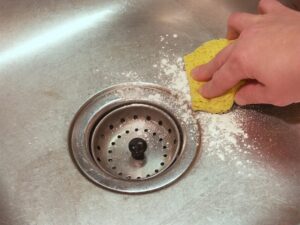▷5 Practical Tips for Cleaning Drains Naturally In San Diego
5 Practical Tips for Cleaning Drains Naturally In San Diego
In the realm of home maintenance, keeping drains clean is crucial for a smoothly running household. With these 5 expert tips, you can tackle drain cleaning like a pro. From natural DIY solutions to preventive measures, we’ve got you covered. Say goodbye to clogs and foul odors with easy-to-implement strategies that will leave your drains sparkling and odor-free. Dive into our comprehensive guide and bid farewell to plumbing issues for good.
Understanding Drain Maintenance
Importance of Regular Cleaning
Regular cleaning of drains is crucial to prevent clogs and blockages that can lead to costly repairs. Neglecting this maintenance can result in foul odors, slow drainage, and even backups in your plumbing system.
- Pros:
- Prevents clogs and blockages
- Avoids foul odors and slow drainage
- Cons:
- Time-consuming
- May require professional help in severe cases
To maintain a healthy plumbing system, it’s recommended to clean your drains at least once a month. This routine upkeep can significantly extend the lifespan of your pipes and prevent major issues down the line.
Natural vs Chemical Solutions
When it comes to drain cleaning, you have the option to use either natural or chemical solutions. Natural solutions like baking soda and vinegar are environmentally friendly and safe for your pipes. On the other hand, chemical cleaners are quick-acting but can be harsh on your plumbing system.
- Natural Solutions:
- Environmentally friendly
- Safe for pipes
- Chemical Solutions:
- Quick-acting
- Harsh on plumbing
Opting for natural solutions not only helps maintain a greener household but also reduces the risk of damaging your pipes with harsh chemicals.
Step-by-Step Cleaning Guide
Boiling Water Method
To start unclogging drains, pour boiling water down the drain to melt and wash away grease build-up. The hot water helps break down any substances causing blockages.
Disposal Care
Avoid pouring fats, oils, and coffee grounds down the disposal to prevent clogs. Use cold water while running the disposal to solidify grease for easier removal.
Vinegar Solution
Create a mixture of vinegar and baking soda to fizz and clear blockages in drains. Pour the solution down the drain and let it sit for a few hours before rinsing with hot water.
Plunger Technique
Use a plunger to create pressure and dislodge debris blocking the drain. Position the plunger over the drain, push and pull vigorously to remove obstructions effectively.
Wire Hanger Trick
Straighten a wire hanger and create a small hook at one end to fish out hair and debris from drains. Insert the hanger into the drain, hook onto clogs, and pull them out.
Preventative Measures
Avoiding Grease
Avoid pouring grease down the drain to prevent clogs and build-up. Dispose of grease in a container instead.
Installing Drain Screens
Install drain screens to catch hair, food particles, and other debris before they enter the drain. Regularly clean these screens to maintain their effectiveness.
Regular Maintenance Tips
Flush drains with hot water regularly to prevent blockages. Use a mixture of vinegar and baking soda for a natural cleaning solution.
- Pros:
- Prevents clogs and build-up
- Easy to implement
- Cons:
- Requires consistent effort
- May need occasional professional maintenance
Remember, regular maintenance is key to keeping your drains clear. By following these preventative measures, you can avoid costly repairs and ensure smooth drainage in your home.
Signs of Drain Issues
Odor Detection
Unpleasant smells emanating from your drains can indicate accumulated debris, leading to potential clogs. Regular cleaning can help prevent these odors and maintain a fresh environment in your home.
Slow Drainage
Water draining slowly in sinks or showers is a common sign of blockages in the pipes. By cleaning your drains regularly, you can prevent this issue and ensure smooth water flow.
Unusual Noises
Gurgling or bubbling sounds coming from your drains may signal air trapped in the pipes due to blockages. Cleaning out the drains can eliminate these noises and improve drainage efficiency.
Future Considerations
New Home Clog Prevention
When moving into a new home, ensure to prevent future drain clogs by being cautious with what goes down the drains. Avoid disposing of grease, coffee grounds, and food scraps in the kitchen sink. Install drain screens to catch hair and debris in the bathroom drains.
- Use drain guards
- Dispose of waste properly
To maintain a healthy drainage system in your new home, establish a routine maintenance schedule. Regularly flush drains with hot water to prevent buildup and blockages. Consider using natural remedies like baking soda and vinegar to keep drains clean and odor-free.
Long-term Maintenance Strategy
For long-term drain maintenance, schedule annual professional inspections to identify potential issues early on. Invest in drain cleaning services to remove stubborn clogs and buildup effectively. Replace old pipes if necessary to prevent future drainage problems.
- Annual inspections
- Professional drain cleaning
FAQs
How Often Should I Clean My Drains?
It is recommended to clean your drains at least once a month to prevent clogs and maintain proper drainage flow. Regular cleaning can help avoid costly repairs and ensure your plumbing system functions efficiently.
What Are Some Preventative Measures To Keep Drains Clean?
To maintain clean drains, avoid pouring grease or oil down the drain, use drain strainers to catch debris, run hot water after each use, and periodically flush drains with a mixture of vinegar and baking soda. These simple steps can prevent blockages.
What Are The Common Signs Of Drain Issues?
Common signs of drain issues include slow drainage, foul odors coming from drains, gurgling noises, water pooling around drains, and multiple fixtures experiencing clogs simultaneously. If you notice any of these signs, it’s essential to address the issue promptly.
How Can I Effectively Clean My Drains Step-By-Step?
Start by removing visible debris, then pour a mixture of hot water, baking soda, and vinegar down the drain. Follow up with boiling water to flush out any remaining buildup. Repeat this process regularly to maintain clean and odor-free drains.
Why Is Understanding Drain Maintenance Important?
Understanding drain maintenance helps you prevent costly repairs, avoid inconvenient clogs, and ensure your plumbing system operates smoothly. By following proper maintenance techniques and being proactive in caring for your drains, you can extend the lifespan of your plumbing infrastructure.
In conclusion, maintaining clean drains is essential for a healthy home environment. By following the step-by-step cleaning guide and implementing preventative measures, you can avoid costly repairs and ensure smooth drainage. Recognizing the signs of drain issues early on empowers you to take proactive steps, saving you time and money in the long run. Considering future considerations like regular maintenance schedules will keep your drains in top condition, preventing clogs and backups.
Take charge of your drain health today by incorporating these tips into your cleaning routine. Your diligence will not only benefit your home but also contribute to a stress-free living space. Remember, a little maintenance goes a long way in preserving the efficiency of your drains. Keep them clean, keep them flowing!
Conclusion
Give Home Pro Plumbing a call right away to learn more about how our experts can help with leak detection in San Diego, CA.
Our Plumbing & Leak Detection Services
Related Posts

▷5 Benefits of Hydro Jet Plumbing: A Comprehensive Guide In San Diego
5 Benefits of Hydro Jet Plumbing: A Comprehensive Guide In San Diego Hydrojet plumbing is a…

▷Essential Tips for Installing a Heat Pump Water Heater In San Diego
Essential Tips for Installing a Heat Pump Water Heater In San Diego Did you know…

